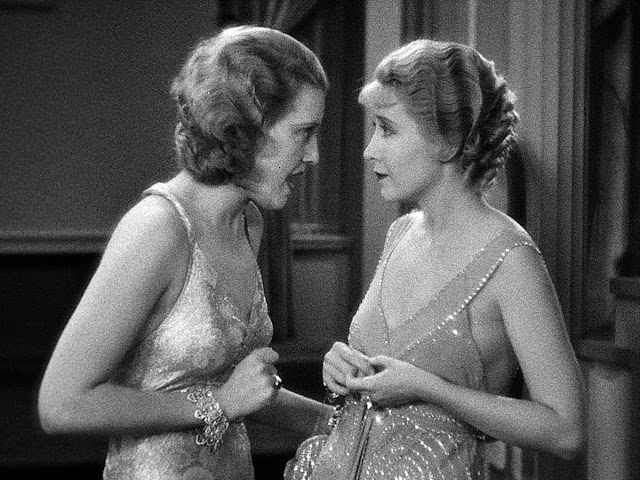One Hour with You is an early 1930s pre-code romantic drama that tackles a subject that I will always find distasteful: infidelity. Anytime a film makes light of the subject of cheating on a spouse, it is on shaky ground with me, and this one is no exception. Still, it has a couple of things going for it: it stars Maurice Chevalier and Jeanette MacDonald, who were a charming couple on The Love Parade. But whatever magic they had from that film is lessoned in One Hour with You, which jettisons any real character for a series of circumstances designed to drive a wedge in their marriage.
The gist of the story is that Andre Bertier (Maurice Chevalier) is a Parisian doctor who is dedicated to his wife. When we are introduced to him, he is in the park at night, making out with her like they are teenagers just figuring things out. As the Parisian police are determined to clean up the streets from this sort of filth, they are quickly busted up and sent on their way. The wife, Collette (Jeanette MacDonald), loves her husband, too, but is a little bit suspicious of him, especially as he is seemingly pursued by his lovely female patients who cannot understand his devotion to his marriage.
Into that mix comes Mitzi Olivier (Genevieve Tobin), an old friend of Collette’s, who immediately sets her eyes on Andre despite being married herself. Mitzi is very forward with her affections, too, making no secret with Andre that she intends to have him. On top of that, Adolph (Charles Ruggles), a handsome young man, has set his eyes on Collette and uses whatever opportunities he can find to try and swoop in and steal her away. All of this leads to a comedy of misunderstandings as Collette begins to suspect Andre of infidelity, and Andre, try as he might, cannot convince her otherwise. His run-ins with Mitzi put his devotion to his wife to the ultimate test, especially after she kicks him out of the house.
This film is based on the stage play Only a Dream by Lothar Schmidt. When adapting it for film, little was done to hide its origins. The settings are limited, the staging is mostly stagnant, and the dialogue and musical numbers are just as they would be on a stage. Andre talks to the audience often, inviting answers to questions or to beg those watching to be understanding of the dilemma he is in. In the final scene, Collette does the same, putting their joined situation to the audience and asking us not to pass moral judgment on her for forgiving her husband for his improprieties. Handled correctly, this kind of fourth wall breaking works well for a comedy. Ferris Bueller used this trope well in one of thequintessential 1980s films. Here, though, it just feels like a crutch, like the writers trying to justify bad behavior on the part of Andre; it’s a poor substitution for real character development.
The singing isn’t done well, either. The songs are great and they are performed well, but they never feel organic to the plot. Instead, when a musical number occurs, it feels like everything stops and the singers are putting on a show rather than the song advancing the plot. It’s a relic of early musicals that thankfully was phased out in later years. These numbers are stagnantly staged while at the same time beautifully sung. It makes for a good soundtrack but only passable cinema.
As a story, there is really very little here. It’s a comedy of errors, but it isn’t any deeper than that. For entertainment, it is passable, but it is not on par with the best Hollywood has to offer. Both of these lead actors have done far better pictures in their careers, and they are perfectly charming here, but the script is letting them down. There simply is no depth to their characters, and we care little, beyond the surface level, for them, especially after Andre begins to give in to the temptations Mitzi presents him.
This film was the source of a credits lawsuit. Ernst Lubitsch, who supervised the preproduction of the film, had to drop out because of time overruns on his previous film. George Cukor was brought in to take over for him, but after a couple of weeks, Cukor was clashing with the star, Chevalier, and was removed from the picture. By this time, Lubitsch was able to take over, and he received sole director credit. Cukor felt that he deserved a co-director credit and sued for it. The outcome was that Cukor received an assisting the director credit and was allowed to break his contract with Paramount and take a job at RKO instead. This kind of production shift could leave a film feeling fractured and inconsistent, much like Superman II would after going through a similar director change. Fortunately the film as a whole avoids this problem and feels like a singular production.
The final film has an unfinished feel to it, though. After Andre and Collette reconcile, the drama with Mitzi and her husband is handled in a matter of seconds with some lip service to her getting a divorce. As far as Andre and Collette, they turn to the audience and present the conundrum they are in before justifying their actions by saying they will stay together despite the infidelities because of love. This feels like a cop-out and is largely unsatisfying. As a whole, this is a disappointing film. It has its funny moments, but they cannot overcome the distasteful premise. Ultimately, this is a forgettable film that doesn’t deserve its spot in the Academy Awards.
Academy Award Nomination:
Outstanding Production: Ernst Lubitsch
____________________________________________________
Release Date: March 22, 1932
Running Time: 80 Minutes
Not Rated
Starring: Maurice Chevalier, Jeanette MacDonald, and Geneviève Tobin
Directed By: Ernst Cukor with assistance by George Cukor








Comments
Post a Comment